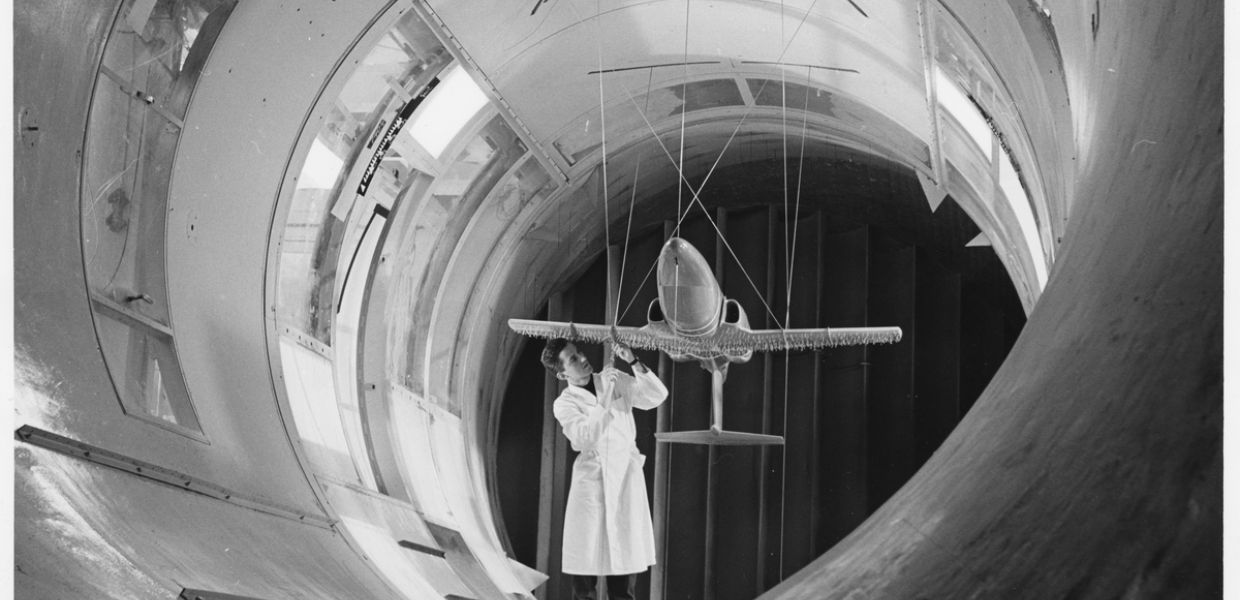Italian students use Europeana content to create multimedia products for #HackCultura2019
Discover more about how #HackCultura2019 has encouraged Italian students to reuse content from Europeana.eu!

- Title:
- Låghastighetsmodell av flygplan Saab 105 i vindtunnel på Flygtekniska försöksanstalten. En man hänger upp modellen
- Creator:
- Flygtekniska försöksanstalten
- Institution:
- Flygvapenmuseum
- Country:
- Sweden
- Copyright:
- Public Domain
#HackCultura2019 encourages Italian school students to take charge of their national cultural heritage - tangible, intangible and digital - through the development of digital products. It is an initiative of The Digital Cultural Heritage, Arts and Humanities School network (DiCultHer) in cooperation with the Italian ministries of education (Miur) and culture (MiBAC), INDIRE, Istituto Centrale per il Catalogo Unico (ICCU), Scholas Ocurrentes, Rai Cultura and Europeana. The initiative was launched on 9 October at the Ministry of Education in Rome. It consists of six different challenges, each of them led by one of the above-mentioned partners. It is hoped that the challenge will reach 3.500 schools and 250.000 students.
#imparaconEuropeana: the Europeana challenge for the Italian students
The schools participating in the #imparaconEuropeana challenge will identify a topic for their project and select the suitable Europeana resources for the development of a final product (e.g. a publication, service, digital resource). As an example, students can produce an interactive map of their cities or towns, collecting important monuments and buildings, local inventions and discoveries, or famous historical, artistic or scientific people with open license images available in Europeana platform.
All the final products will be published on a dedicated website, which will be interoperable with the CulturaItaIia national aggregator and, thus, depending on the value included into Europeana Collections. The best projects will be presented during the Antonio Ruberti Digital Week of Culture, a series of virtual and physical events between 8 and 14 April 2019.
Students participating in this challenge will acquire:
-
media literacy skills (including how to use visual and multimedia tools to produce images, audio, video, photo galleries)
-
copyright knowledge and how to use and reuse digital cultural heritage for a creative project
-
collaborative skills
-
entrepreneurship
-
and a sense of ownership of their digital cultural heritage
Teachers and schools can find all the necessary information about the contest terms.
How to get inspired
Entrants can select the reusable content that interests them but can also make use of a User Guide as well as some relevant Europeana resources in Italian.
On 11 January at 17:00, Teresita Gravina, Europeana Teacher Ambassador for Italy, and Sara di Giorgio, Technical responsible of CulturaItalia, will give a webinar on how to use Europeana resources in education and prepare for the challenge.
This is a unique opportunity for teachers to experience state-of-the-art teaching, to develop skills in digital culture and to stimulate awareness of a European identity and citizenship among your students. Don’t miss it!

